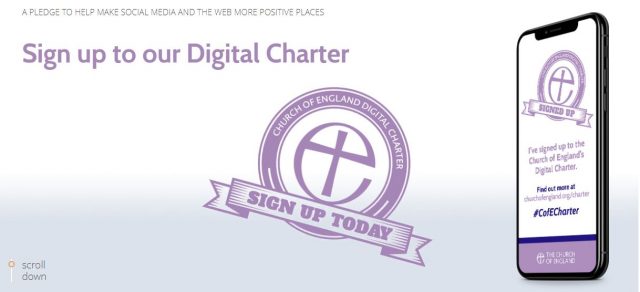
The Church of England is encouraging individuals and churches to sign a voluntary pledge to help make social media and the web more widely positive places for conversations.
Whether you use Facebook or you are commenting on a news article, we all have different views, experiences, and interests that will affect how we perceive things, and our responses to those events. The comments we make can reach thousands of people around the world very quickly. But in so doing, we need to apply the same common sense, kindness, and sound judgement that we would use in a face-to-face encounter.
Even when we have robust disagreements on an issue, the Church of England’s pledge recommends applying the following values:
- Truth – we should hold ourselves to high ideals of checking that what we post online is fair and factual.
- Kindness – we are all different and that makes the world an interesting place – and at times a challenging one. Think the best of people, whether they share our views or are speaking against them and aim to be constructive in the way we engage.
- Welcome – in the language we use and the way we interact. It’s easy for Christians to speak in another language using words that those outside the Church might not relate to.
- Inspiration – we are called to be witnesses of our faith and to use social media in a way that genuinely engages others.
- Togetherness – we are one Church and other members of this Church are our brothers and sisters in Christ. It is crucial we treat those around us in this way.
- Safeguarding – if you have any concerns about the wellbeing of children, young people and vulnerable adults, please contact the relevant diocesan safeguarding adviser.
- Agree to the Church’s and Archbishops’ social media guidelines.
The Church of England has also published community guidelines for their own social media use, which include the following:
- Be safe. The safety of children, young people and vulnerable adults must be maintained.
- Be respectful. Do not post or share content that is sexually explicit, inflammatory, hateful, abusive, threatening or otherwise disrespectful.
- Be kind. Treat others how you would wish to be treated and assume the best in people. If you have a criticism or critique to make, consider not just whether you would say it in person, but the tone you would use.
- Be honest. Don’t mislead people about who you are.
- Take responsibility. You are accountable for the things you do, say and write. Text and images shared can be public and permanent, even with privacy settings in place. If you’re not sure, don’t post it.
- Be a good ambassador. Personal and professional life can easily become blurred online so think before you post.
- Disagree well. Some conversations can be places of robust disagreement and it’s important we apply our values in the way we express them.
- Credit others. Acknowledge the work of others. Respect copyright and always credit where it is due. Be careful not to release sensitive or confidential information and always question the source of any content you are considering amplifying.
- Follow the rules. Abide by the terms and conditions of the various social media platforms themselves. If you see a comment that you believe breaks their policies, then please report it to the respective company.
These guidelines include great ideas to guide your use of social media. Would you consider having a discussion with your family and friends about how to make social media a safer, more positive experience for everyone?
